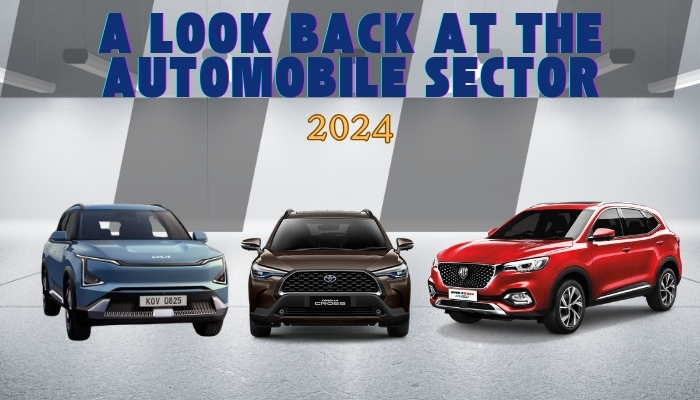
Pakistan's automobile sector has witnessed significant growth in 2024, driven by the launch of new cars and bikes catering to diverse consumer preferences. As the year concludes, it is worth examining the key developments that shaped the industry.
The past year saw notable car launches in Pakistan, including the Kia Sorento Hybrid CKD, Hyundai Tucson 4th Generation, and Honda HR-V Hybrid. These models not only expanded the product portfolios of their respective manufacturers but also provided Pakistani consumers with a broader range of choices.
Speaking to Gadinsider, Association of Pakistan Motorcycle Assemblers (APMA) Chairman Sabir Shaikh, shared insights into the current state of Pakistan's automobile sector, discussing challenges, opportunities, and prospects. The Engineering Development Board (EDB), operating under the Ministry of Industries and Production, plays a pivotal role in regulating the automobile industry. "The EDB provides licenses to manufacturers, but the process needs to be streamlined to encourage investment," Shaikh suggested.
Shaikh emphasised the need for a comprehensive policy framework to govern the automobile industry. "The government provides a policy for running an industry, but it's not conducive to growth," he noted. "To set up a small factory or make modifications to an existing model, you need a license. This creates unnecessary hurdles and discourages investment."
Speaking to Gadinsider, industry analyst Osama Naeem said that the performance of Pakistan's auto sector in fiscal year 2024, both in terms of revenue and sales, fell significantly short of expectations. Passenger car sales hit a 15-year low, driven by two primary factors:
- High financing rates
- Surge in car prices due to currency devaluation and increased Cold Rolled and Hot Rolled Coil (CRHRC) prices.
Overall, sales in 2024 were lower than in 2023. Major Original Equipment Manufacturers (OEMs), including Indus Motors, Honda, and Pak Suzuki, struggled with declining sales. Honda Motor Company reported a steep 42% drop in sales, while Toyota Indus experienced a 14% revenue decline.
“In fiscal year 2024, during the early months, car manufacturers faced significant challenges related to supply chain disruptions,” said Naeem. “The State Bank imposed restrictions on non-essential imports, making it difficult to open Letters of Credit (LCs) and procure supplies.”
Naeem further explained that as Pakistan's foreign exchange reserves improved and the current account deficit narrowed, the State Bank gradually eased these restrictions, leading to an improvement in the supply chain by the end of the fiscal year.
To combat declining sales, OEMs introduced discounts and promotions. For instance, Honda offered discounts on the City model, while Suzuki launched a new version of the Swift and announced major discounts.
New EV models hit the Pakistani market in 2024
Gadinsider has compiled a comprehensive lineup of all the electric vehicles (EVs) launched in Pakistan during 2024:
- Hyundai Ioniq 5: Launched in March at Rs20.5 million, this model features a fully digitised dashboard and eco-friendly materials.
- Honri Ve: Introduced in June at Rs3.9 million, the Honri Ve comes equipped with a Ternary Lithium Battery and Permanent Synchronous motor, producing a maximum power of 30 kW and torque of 84 Nm, with a top speed of 100 km/h.
- Deepal S07 and Deepal L07: Priced at Rs10.5 million and Rs10.4 million, respectively, these models feature 254 hp and 320 Nm torque. Both are powered by a 66.8 kWh battery, offering a 540 km driving range and fast charging from 30% to 80% in 35 minutes.
- BYD Seal: Introduced in August at Rs10.5 million, the BYD Seal boasts a 61.4 kWh or 82.5 kWh LFP blade battery pack, compatible with DC fast chargers at 110 or 150 kW.
- BYD Atto 3: Launched in October for Rs9 million, this model integrates a 150 kW front-wheel-drive electric motor generating 310 Nm of torque and is powered by BYD’s proprietary lithium iron phosphate (LFP) blade battery.
- Kia EV5: Also launched in October at Rs2.35 million, the EV5 aims to make electric ownership accessible with a lower initial investment.
The introduction of these EVs has left a significant impact on the Pakistani market. Shaikh expressed optimism about the future of hybrid and electric vehicles in Pakistan. "New companies like BYD, Evee, E-Turbo, Vlektra, and more are expected to disrupt the market in the next 5-6 years," he said. However, he also highlighted the lack of infrastructure, including charging stations and skilled mechanics, as a major barrier to widespread EV adoption.

Sales performance of major automobile brands
Honda
Honda City and Civic sales observed a considerable increase of 47% in 2024, with 14,303 units sold compared to 9,760 units last year.
Suzuki
Pak Suzuki Motor Company Limited (PSMC) achieved a 63% jump in sales, selling 57,345 cars this year against 35,253 units in 2023 (January to November).
Toyota
Toyota experienced a 27% sales increase, with 24,460 units sold in the last 11 months compared to 19,320 vehicles during the same period in 2023.
Hyundai
Hyundai Nishat Motors recorded a 12% sales boost, managing to sell 8,109 units in 2024 compared to 7,096 vehicles in 2023.
Despite this growth, the industry faced challenges. Although 13 factories are currently operational, sales volumes have decreased due to reduced purchasing power, exacerbated by the depreciation of the Pakistani rupee. In response, automobile companies have introduced innovative financing solutions, including interest-free instalment plans. "This has helped make vehicles more accessible to consumers," Shaikh added.
Shifting trends towards sustainable mobility
A notable trend in 2024 was the increased launch of electric vehicles compared to fuel-efficient vehicles, signalling a significant shift towards sustainable mobility. Shaikh envisioned a future where Pakistan becomes a hub for electric vehicles, gradually phasing out fuel-powered models. However, he estimated that this transition might take 5-6 years.
Motorcycles continue to play a substantial role in Pakistan’s transportation landscape, with annual consumption per motorcycle averaging 240-250 litres. Motorcycles account for approximately 35-40% of the total petrol market size annually.

Looking ahead
As 2024 draws to a close, Pakistan's automobile sector appears poised for continued growth. The industry's shift towards electric and hybrid vehicles, driven by government incentives and increasing consumer awareness, is expected to gain momentum in the coming years. However, addressing infrastructure gaps and creating a conducive policy environment will be critical to sustaining this growth trajectory.
According to Naeem, 2025 is expected to be a pivotal year for the automobile industry, with several notable launches anticipated:
- Kia: New Sorento variant and the 5th generation Sportage, including hybrid versions.
- Hyundai: 4th generation Tucson and Sonata models.
Additionally, 2025 is set to witness a surge in Electric Vehicles (EVs) and Hybrid Electric Vehicles (HEVs), with initial units expected to be Completely Built Units (CBUs).
















